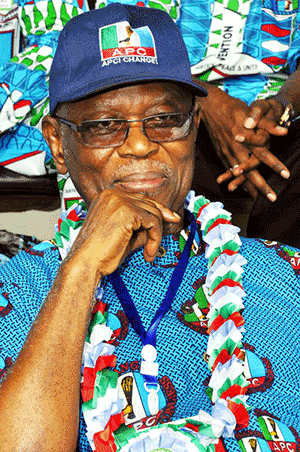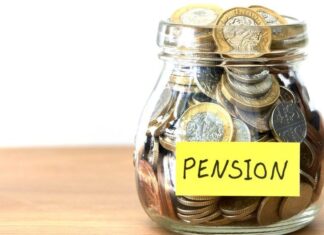Senior Correspondent, ISHAYA IBRAHIM, examines the implication of the several defections in the polity, especially those in favour of the PDP, and reports that it could put democracy in greater danger.
Odigie Oyegun
Going by the wave of defections in favour of the Peoples Democratic Party (PDP), which holds sway at the centre, Nigeria seems to be heading for a one-party polity.
This is despite efforts of the opposition in February 2013 to halt the trend. The hitherto Action Congress of Nigeria (ACN), Congress for Progressive Change (CPC), All Nigeria Peoples Party (ANPP) and some elements from All Progressives Grand Alliance (APGA) merged into a mega opposition in February 2013 to forge a formidable opposition against the PDP ahead of 2015 general election.
Opposition leaders joining PDP
But events after the merger are making the dream a tall order. As it is, without the APC pulling off a new joker from its magic box, the 2015 general election could again be dominated by the PDP. For instance, key leaders of the opposition who signed the merger, including Tom Ikimi (ACN), Senator Annie Okonkwo (APGA), and former governor of Kano State, Ibrahim Shekarau (ANPP), have all dumped the party for the PDP.
Other topnotch APC members, who played prominent roles in the merger but abandoned it midway, include the former ANPP Board of Trustees (BoT) chairman, Ali Modu Sheriff; erstwhile Sokoto State Governor, Attahiru Bafarawa; ACN presidential candidate in the 2011 election, Nuhu Ribadu; and many others. All of them are now card-carrying members of the ruling party.
While the APC is believed to be the main target of this bleeding exercise, APGA, one of the leading political parties in the South East, is also losing considerable number of its stalwarts to the PDP.
On August 5, APGA lost some federal lawmakers representing Anambra to the PDP. They are Uche Ekwunife, Chairman, House of Representatives Committee on Environment; Chris Emeka Azubogu, Deputy Chairman, House Committee on Capital Market; Cyril Egwuatu, representing Onitsha North/ Onitsha South federal constituency; and John Olibie, Chairman, House Committee on Culture, Tourism, Pilgrimages and Religious Matters.
There are also rumours that the former governor of Anambra, Peter Obi, who recently resigned as chairman of APGA BoT, may be heading for the PDP any moment soon, to take a job as President Goodluck Jonathan’s campaign mobiliser ahead of the 2015 election.
For chieftain of the Arewa Consultative Forum (ACF), Anthony Sani, the gale of defections in the polity gives cause for concern for Nigeria’s democracy.
“When people, especially the youths, gloat over the defections from APC to PDP, I begin to wonder whether they see the peril in one-party state, since democracy without an opposition as viable alternative platform is a sham and capable of enthroning party dictatorship as a precursor to individual dictatorship.”
Explaining the defections
The PDP is undoubtedly the most attractive political boat in the country, not on account of having superior political ideology, but for its brighter chances of winning elections, owing largely to the federal resources at its beck and call, analysts say.
President, Voters Awareness Initiative (WAI), Wale Ogunade, says it is stomach infrastructure that is the driving force for the action.
“The political class, particularly these politicians, is a bunch of shameless people. They have no ideology. That is why in the morning they are in one party, in the afternoon of the same day they are in another party, and in the evening of the same day you see them going to sleep with another party. I call them political harlots.
“Can one tell you that Ribadu can leave APC? This is a man that has said that all the people in PDP are thieves, including Jonathan. He claimed to have investigated Jonathan, his wife, and all the senators. Just because he sees that there is an opportunity for him to be the governor of Adamawa State, he moved to the PDP. Is that not shameless? And God has caught him. Members of the PDP he wants to join are now ganging up against him. Which party will he now join? Can you see that he has been abandoned?” Ogunade said.
APC’s initial advantage
In November 2013, five governors of the PDP made a deft move to the APC, having failed to convince President Jonathan not to contest the 2015 election. The governors are Murtala Nyako (Adamawa), Rotimi Amaechi (Rivers), Aliyu Wamakko (Sokoto), Abdulfatah Ahmed (Kwara) and Rabiu Kwankwaso (Kano). The immediate impact of the move was that APC had control of 16 states, PDP 18, Labour Party (LP) and APGA, one each.
Since APC controls the two states with the most populous voting population (Lagos and Kano), these early gains significantly bolstered the confidence of the party in its resolve to replace the government at the centre.
With this advantage, coupled with the fact that it commands huge followership in the PDP-controlled states of Kaduna and Katsina, the APC seemed comfortable in the build-up to the 2015 presidential contest.
The party further attracted 37 PDP lawmakers in the House of Representatives and 11 of their counterparts in the Senate.
PDP fights back
Faced with depletion of its rank but determined to reverse the trend, the PDP appointed Adamu Mu’azu as its new chairman, to replace the controversial Bamanga Tukur whose tenure was characterised by in-fighting in the party.
Mu’azu quickly moved into action. Once he took over, he told his party men that he had perfected plans to beat the opposition parties on poaching and, as many would swear, infiltration.
“We will soon show the opposition that we are master poachers. They teach us to poach and we will beat them at it because when two members of your family fight, you should settle them and not for you to come and pit one against the other. However, if that is the game, we will learn,” Mu’azu said.
PDP seems to have learned well in this game of poaching, given that soon after the comment by Mu’azu, the tide suddenly changed, with leading APC members, including those who superintended its formation, moving in droves to the PDP fold.
The party, still in a mood to decimate the APC, employed the impeachment tool to actualise the objective, observers allege.
In this regard, governors of Rivers, Edo, Nasarawa and Adamawa states were shortlisted by the party’s point men for removal. While the party’s foot soldiers succeeded in removing the Adamawa governor, they met a fierce resistance in the other states.
With the impeachment of Nyako and the failure of Kayode Fayemi to get re-elected as Ekiti State governor, APC has now been left with 14 states.
Even the party’s hold on its 14 states is still shaky, judging from the second attempt to impeach the Nasarawa Governor, Tanko Al-Makura, by the House of Assembly.
The lawmakers had listed some impeachable offences against the governor, but a panel constituted by the Chief Judge of the state quashed the charges. The Assembly is believed to be making another fresh move to oust the governor in league with a judge to be appointed by the lawmakers who would be expected to raise a probe panel sympathetic to their cause.
This move has angered the opposition stalwarts, including George Akume, Senate Minority Leader, who in a column in ThisDay on Tuesday, August 26, accused PDP of attempting to destroy the opposition using the impeachment weapon.
“One may ask where all this (impeachment) is leading to. Clearly, this is to destroy opposition and democracy. There cannot be democracy without meaningful opposition. That is why the constitution has provided roles for the opposition. Nigeria has seen more robust and purposeful politicking with the emergence of the majority opposition party, APC,” wrote Akume.
Option before the opposition
The option before the opposition, especially the APC, is to remain focused on ideological bent, analysts say, adding that it must define its tenets and stick to them.
“The opposition must also espouse internal democracy and shun the penchant for consensus candidacy, the bane of all the political parties in Nigeria,” said Ayuba Isuwa, a political scientist.
The consensus candidacy, which often turns out to be mere imposition, is what has been seen as the greatest undoing of the nation’s opposition politicians. Recently, Ikimi, in a letter resigning his membership of the APC, accused one of the national leaders of the party, Bola Tinubu, of running the party like his personal chiefdom.
“Major decisions said to be party decisions now started emerging from this select group whose ad-hoc membership varied from time to time. They usually congregated at Tinubu’s private parlour in his Asokoro, Abuja, residence. Those who wanted to belong had to find or force their way into that parlour. Once initiated, your independence or capacity to challenge the plots that emerged from that cult venue became seriously curtailed,” he alleged.
Whether Ikimi’s allegations were true or otherwise, the APC must avoid allowing individual members to become greater than the party itself, enlightened commentators have warned.
The voters’ choice in 2015
Ogunade said that given the turn of events, the voter has difficult task of sieving among the many politicians masquerading in the land.
“The option the voter has is to sieve among these people because they will come like sheep, but they are all wolves. All they are interested in is their personal pocket. They are not interested in the development of the society; they are not interested in the development of the people.
“Ebola has shown that things can work in this country. You saw the fight they gave Ebola, because Ebola is a leveller. It does not know anybody, whether you are a governor or president. Once it catches you, you are finished.
“So, you see that government can be effective. Cholera, as I am talking to you, still ravages the country. But because cholera cannot get to them, they care less about providing water for the rural people,” he said.
Many agree with him, warning, however, that with the dwindling fortunes of the opposition, occasioned by defection of its members, the country’s democracy may remain the ultimate loser.














